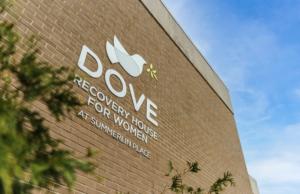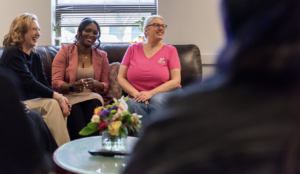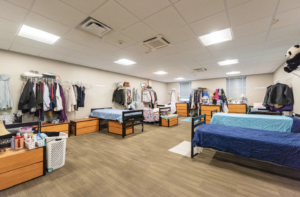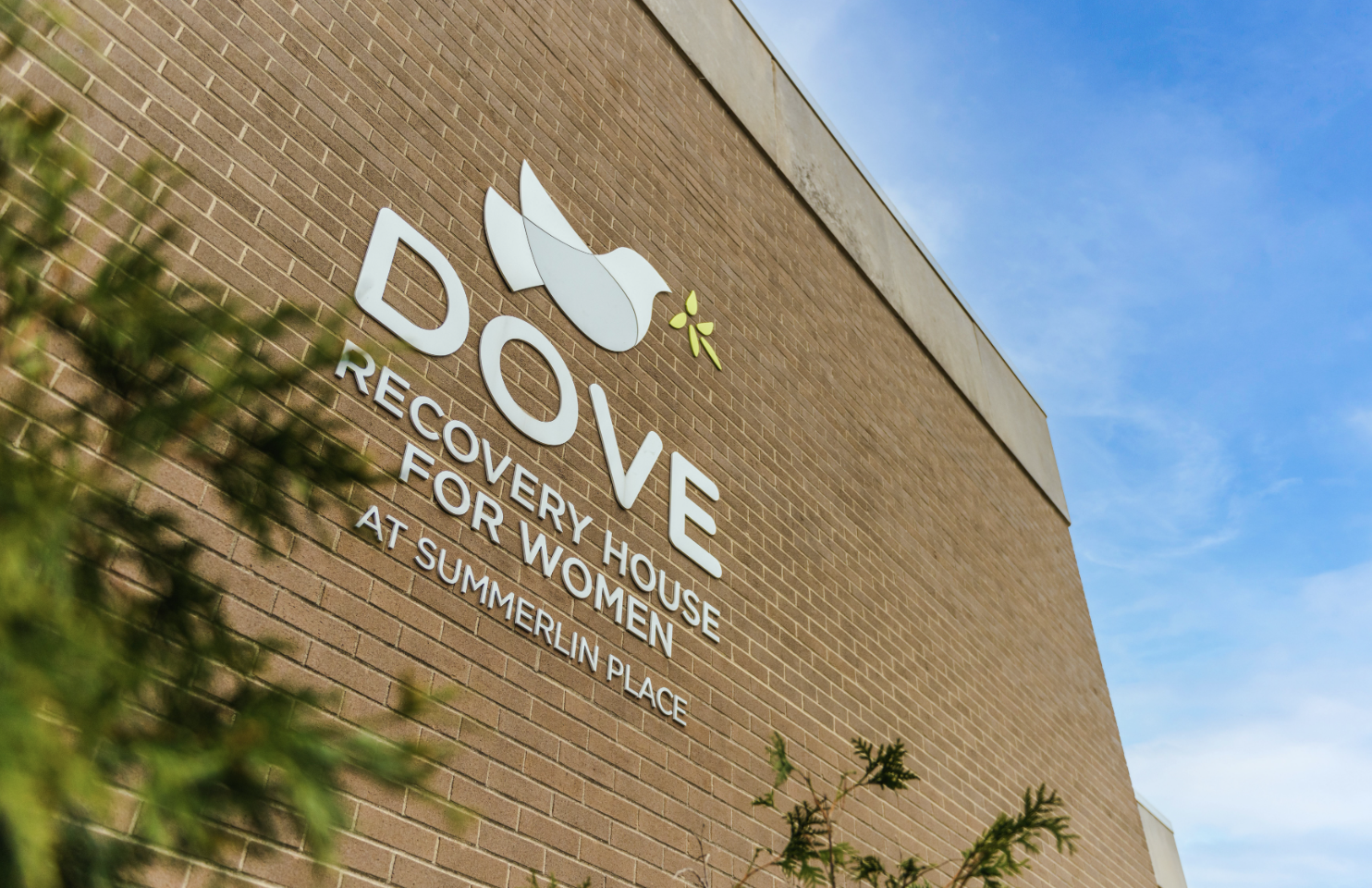Recovery Within Reach
Hope Abounds at Dove Recovery House for Women
Writer & Photographer / Jaylan Noelle
In 2001, Trudy Brown noticed a disparity between the number of sober living homes for women and men in Indianapolis. She decided to open Dove Recovery House for Women.
When Chief Executive Officer Wendy Noe joined the organization eight years ago, Dove House had a staff of six, housed 23 women, and had few policies and procedures in place. It now has a staff of 35, serves 40 women per night, and operates a second campus in Jasper, Indiana, where that location serves 15 women per night.
Today our program is very comprehensive, Noe says. We want them sober, and theyre living here sober, but what we say is that traumas are really gateway drugs.
Doves programming centers around addressing clients trauma. According to Noe, the average age of first drug use is 13, nearly all addicts have experienced trauma, and about 90% experienced childhood sexual trauma.
Trauma is what brings them to substance use, Noe says. If we dont identify that trauma, then were just going to see a repeating cycle.
The programs success rate is more than 70%. Success requires that residents stay at the house for at least 90 days, leave the program without being re-incarcerated and with stable housing, employment or enrollment in education, and reunite with family and friends.
So theyre reentering our community and theyre contributing members, Noe says.
Dove Recovery House for Women served more than 100 women in 2022 alone, and hundreds of women since its founding.
With drug overdose as the leading cause of accidental deaths in the United States, according to the CDC, the work of Dove House has a profound impact on the community.
Were living with an epidemic thats not really being talked about, Noe says. The reality is that everyone knows someone with substance use disorder, and whether we think we do or not, we do.
Women who enter Dove Houses program are enrolled in health insurance, and receive health checks and appropriate medication to stabilize mental health issues. The work done by Dove House reduces the burden on the criminal justice system by reducing the number of women being re-incarcerated. Doves work to reunite mothers with their children also reduces the number of children in the foster care system, and aims to stop the next cycle of trauma which may lead to substance abuse disorders.
The women are reentering society, Noe says. Theyre becoming taxpayers. They have health insurance. They have new, healthy lifestyle behaviors. Were helping the women become the women theyre meant to be.
Kristy Shene, a graduate of Dove Recovery House, is now a certified addiction peer recovery coach and works for Dove House as a peer recovery case manager.
 Shene began using drugs at age 17 and spent seven years in and out of addiction. In 2013 Shene was court-ordered to the recovery home and stayed for six months before relapsing. Two years later, after being released from jail, Shene walked straight to Dove House.
Shene began using drugs at age 17 and spent seven years in and out of addiction. In 2013 Shene was court-ordered to the recovery home and stayed for six months before relapsing. Two years later, after being released from jail, Shene walked straight to Dove House.
I didnt even have a bed waiting for me or anything, Shene says. I ended up getting to stay, and I just worked really hard and put my everything into it.
Though she struggled and relapsed again, Dove House staff helped her overcome and supported her through the adoption of her children. Once Shene finished the program, the staff helped her enroll in college and made sure she got the training necessary to work in her current position.
Now I have five years clean and Ive been working here in this position for three years, Shene says. Dove House taught me how to deal with things and how to cope without using. Now I get to assist those women, the same women who are just like me, in finding other outlets for their feelings. Because if I did it, you could do it.
Reducing stigma around substance abuse disorder is one of the organizations main goals. Dove House recognizes it as a disease and not a personal choice or a moral failing.
We think about all the youth in our communities, especially getting through COVID, who are dealing with trauma in isolation, Noe says. If we don’t talk about it and look at that trauma as that nucleus and that lens, were going to see a repeating behavior. People need help. They need access to resources to turn family and friends away from this.
At 17 years old, Paula Kincade spiraled into heroin use after both her parents died one month apart. Kincade spent years living paycheck to paycheck with five kids, living with family members and struggling with severe depression. Before coming to Dove House, Kincade hadnt ever gone through trauma therapy.
This place actually saved my life, Kincade says. I wish that I would have found this place 30 years ago.
Today, Kincade has been clean off of heroin for five and a half years, and works as the kitchen manager and residential assistant.
Kincade says she spent years believing she was worthless and that no one loved her, before coming to Dove House.
Theyre so proud of me, and Ive never had anyone proud of me, Kincade says. They love you unconditionally. People whove relapsed, theyve forgiven them and are still letting them come. Lots of times I wonder, why are they doing that? Thats because they know what theyre doing.
Clients are not expected to pay for services, removing one of the biggest barriers to accessing treatment.
Community members who wish to support Dove House financially, register for the annual fundraiser celebration luncheon and dessert auction in September, or learn more info, can visit doverecoveryhouse.org.
Dove Recovery House for Women is located at 3351 North Meridian Street, Suite 110 in Indianapolis. Also call 317-964-0450 for additional details.





